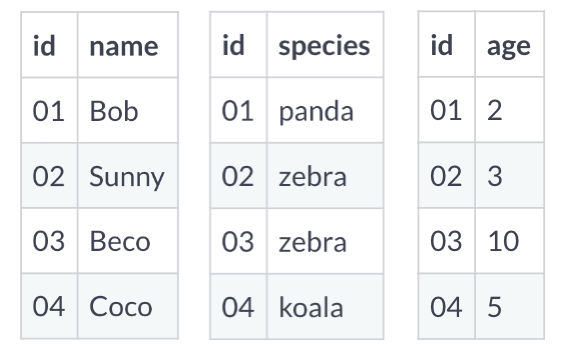Using column-oriented storage
Improving Query Performance in PostgreSQL

Amy McCarty
Instructor
Column-oriented
Column-oriented storage
- Relation between rows retained
| id | name | species | age | habitat | received |
|---|---|---|---|---|---|
| 01 | Bob | panda | 2 | Asia | 2018 |
| 02 | Sunny | zebra | 3 | Africa | 2018 |
| 03 | Beco | zebra | 10 | Africa | 2017 |
| 04 | Coco | koala | 5 | Australia | 2016 |
Stored as

Analytics focus - a good fit
Column-oriented storage properties
- One column stored in same location
- Quick to return all rows
- Fast to perform column calculations
Analytics focus
- Counts, averages, calculations
- Reporting
- Column aggregations
Stored as

Transactional focus - a poor fit
Row relationships retained
- Slow to return all columns
- Slow to load data
Transactional focus
- Fast insert and delete of records
Stored as

Database examples
| Postgres | Citus Data, Greenplum, Amazon Redshift |
| MySQL | MariaDB |
| Oracle | Oracle In-Memory Cloud Store |
| Clickhouse, Apache Druid, CrateDB |
Information schema
Reducing the columns
- Use
SELECT *sparingly
SELECT column_name, data_type
FROM information_schema.columns
WHERE table_catalog = 'schema_name'
AND table_name = 'zoo_animals'
| column_name | data_type |
|---|---|
| id | integer |
| name | text |
| species | text |
Information schema
Reducing the columns
- Use
SELECT *sparingly - Use the information schema
SELECT column_name, data_type
FROM information_schema.columns
WHERE table_catalog = 'schema_name'
AND table_name = 'zoo_animals'
| column_name | data_type |
|---|---|
| id | integer |
| name | text |
| species | text |
Writing your queries
- Examine each column in own query
| id | name | species | age | habitat | received |
|---|---|---|---|---|---|
| 01 | Bob | panda | 2 | Asia | 2018 |
| 02 | Sunny | zebra | 3 | Africa | 2018 |
| 03 | Beco | zebra | 10 | Africa | 2017 |
| 04 | Coco | koala | 5 | Australia | 2016 |
-- Structure for column oriented
SELECT MIN(age), MAX(age)
FROM zoo_animals
WHERE species = 'zebra'
-- Structure for row-oriented
SELECT *
FROM zoo_animals
WHERE species = 'zebra'
ORDER BY age
Let's practice!
Improving Query Performance in PostgreSQL

